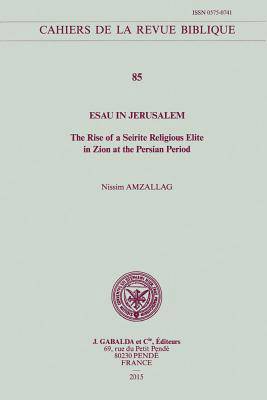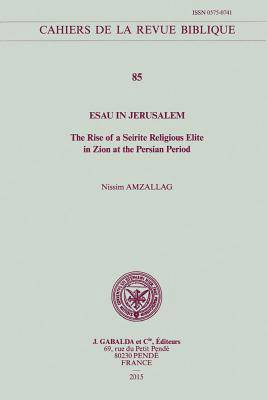
Bedankt voor het vertrouwen het afgelopen jaar! Om jou te bedanken bieden we GRATIS verzending (in België) aan op alles gedurende de hele maand januari.
- Afhalen na 1 uur in een winkel met voorraad
- In januari gratis thuislevering in België
- Ruim aanbod met 7 miljoen producten
Bedankt voor het vertrouwen het afgelopen jaar! Om jou te bedanken bieden we GRATIS verzending (in België) aan op alles gedurende de hele maand januari.
- Afhalen na 1 uur in een winkel met voorraad
- In januari gratis thuislevering in België
- Ruim aanbod met 7 miljoen producten
Zoeken
Esau in Jerusalem
The Rise of a Seirite Religious Elite in Zion at the Persian Period
N Amzallag
Paperback | Engels
€ 132,45
+ 264 punten
Omschrijving
The post-exilic biblical writings speak in two contrasting voices. The first focuses on the Babylonian repatriates and ignores the Israelite population that remained in the land during the exile. It upholds an exclusive relationship between YHWH and the community organized around Jerusalem and its temple. The second voice takes a contrasting and much more universalistic approach to the relationship with YHWH and even promotes its expansion among foreign nations through the diffusion of musical worship. The first voice clearly echoes the theology evoked in Jeremiah (especially in the metaphor of the good and bad figs in Jeremiah 24) and extensively developed in Ezekiel. The second voice, however, appears to be distant from the classical Israelite theology. It is shown in this study that this second voice echoes a pre-Israelite cult of YHWH that originated in the land of Seir and denotes the existence of a Seirite religious elite in post-exilic Zion. Part 1 of the study investigates the reason for the presence of a small group of Edomite/Seirite musicians and poets, self-defined as "sons of Zerah" or "Ezrahites," in early post-exilic Jerusalem, and clarifies the nature of their yahwistic religious background. With the help of the books of Nehemiah, Chronicles, and Psalms, Part 2 analyzes the Levitization of these foreign singers and the opposition this process stimulated among the community of the Sons of Exile. Part 3 examines the transformation of these Ezrahite singers into a new religious elite, a process promoted mainly by Nehemiah and his followers, and explores the theological changes this new situation stimulated. This study uncovers an overlooked reality that had a profound influence on the evolution of post-Exilic yawhism and on the composition and content of many biblical writings. The post-exilic biblical writings speak in two contrasting voices. The first focuses on the Babylonian repatriates and ignores the Israelite population that remained in the land during the exile. It upholds an exclusive relationship between YHWH and the community organized around Jerusalem and its temple. The second voice takes a contrasting and much more universalistic approach to the relationship with YHWH and even promotes its expansion among foreign nations through the diffusion of musical worship. The first voice clearly echoes the theology evoked in Jeremiah (especially in the metaphor of the good and bad figs in Jeremiah 24) and extensively developed in Ezekiel. The second voice, however, appears to be distant from the classical Israelite theology. It is shown in this study that this second voice echoes a pre-Israelite cult of YHWH that originated in the land of Seir and denotes the existence of a Seirite religious elite in post-exilic Zion. Part 1 of the study investigates the reason for the presence of a small group of Edomite/Seirite musicians and poets, self-defined as "sons of Zerah" or "Ezrahites," in early post-exilic Jerusalem, and clarifies the nature of their yahwistic religious background. With the help of the books of Nehemiah, Chronicles, and Psalms, Part 2 analyzes the Levitization of these foreign singers and the opposition this process stimulated among the community of the Sons of Exile. Part 3 examines the transformation of these Ezrahite singers into a new religious elite, a process promoted mainly by Nehemiah and his followers, and explores the theological changes this new situation stimulated. This study uncovers an overlooked reality that had a profound influence on the evolution of post-Exilic yawhism and on the composition and content of many biblical writings.
Specificaties
Betrokkenen
- Auteur(s):
- Uitgeverij:
Inhoud
- Aantal bladzijden:
- 296
- Taal:
- Engels
Eigenschappen
- Productcode (EAN):
- 9782850212420
- Verschijningsdatum:
- 30/09/2015
- Uitvoering:
- Paperback
- Formaat:
- Trade paperback (VS)
- Afmetingen:
- 160 mm x 239 mm
- Gewicht:
- 476 g

Alleen bij Standaard Boekhandel
+ 264 punten op je klantenkaart van Standaard Boekhandel
Beoordelingen
We publiceren alleen reviews die voldoen aan de voorwaarden voor reviews. Bekijk onze voorwaarden voor reviews.









